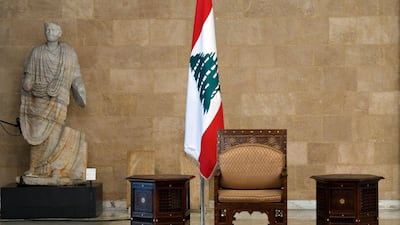Lebanon's main Christian parties, including the rival Lebanese Forces and the Free Patriotic Movement (FPM), are reported to have reached a consensus on former finance minister Jihad Azour to be their candidate for president.
Lebanon is grappling with a presidential vacuum since the departure of former President Michel Aoun from office in October, as the divided parliament has failed to reach a consensus on his successor.
From the Lebanese Forces' perspective, the statements are unequivocal.
Their leader Samir Geagea said in an interview with the pro-Hezbollah newspaper Al Akhbar on Wednesday that an agreement had been reached with the FPM on the candidacy of Mr Azour, whom Mr Geagea described as the “consensual” and “neutral” candidate.
On the FPM's side, the approach is more cautious. If FPM leader Gebran Bassil acknowledged an “agreement” on Tuesday between his party and the opposition, he did not specify the name of the candidate.
The FPM meeting held on the same day continued to build suspense. The party said in a statement that the candidate will be disclosed after “completing the consultations as to the programme and the election mechanism”.
A spokeswoman for FPM told The National that there was a preliminary agreement on Mr Azour as a candidate but that a "program", on which the parties would agree, is more important than a name.
'A distinct DNA'
Observers have highlighted that Mr Azour, who is currently a director at the International Monetary Fund and has a long career in international institutions, stands out in the Lebanese sectarian political landscape.
“His candidacy carries a distinct DNA compared to the parties currently endorsing him. He comes from a non-sectarian background, advocates for preserving Lebanon's national unity, and favours Lebanon's Arab identity,” political analyst Karim Emile Bitar said in an interview with The National.
If his candidacy is confirmed, Mr Azour would be the candidate opposing Hezbollah-backed Suleiman Frangieh.
Mr Frangieh is the head of the Marada Movement, a Lebanese political party and a former Christian militia active during the Lebanese Civil War. He is considered to be a close friend of Syrian President Bashar Al Assad.
Hezbollah, the powerful pro-Iranian political party and militant group, has firmly opposed Mr Azour's candidacy as “a manoeuvre … for the Christian parties to agree among themselves to nominate a person for the presidency”.
“While it is true that a consensus has been reached among the Christian parties around the name of Jihad Azour, this does not mean that there is an official announcement,” Mr Bitar said.
Mr Azour is an “analyst and technician (...) It is not sure he will be willing to go into a frontal one-to-one confrontation with Suleiman Frangieh,” he added.
Mr Azour has not responded officially to the latest developments regarding his candidacy.
Mr Bitar sees the agreement as a way for the FPM and the opposition camp, made up of the Lebanese Forces, the Kataeb party and a coalition of independent MPs, to show there is “an alternative” to Mr Frangieh and “to pave the road for further discussion”.
This is also a significant move, he said, as it is “the first time in a while” that the FPM, which has had a long-standing alliance with Hezbollah, and the Lebanese Forces have demonstrated clear co-ordination.
“It means the FPM has merely started to distance itself from Hezbollah,” Mr Bitar said.
French presses reforms
The international community has consistently called for a presidential election, stressing that the absence of a leader at the head of the state is hindering the implementation of vital reforms needed to address a deepening economic crisis.
France has been particularly engaged for months in pursuing a formula to address the political impasse, advocating for Mr Frangieh as President and someone from the opposition as Prime Minister.
The recent developments within the Christian parties have not seemed to change France's position on the presidential issue.
“The formula is still relevant, as there hasn't been any substantial change yet. Our stance will not change regarding the urgency of meeting constitutional deadlines and moving to implement the needed economic and social reforms," a French diplomatic source told The National.
"If there is more than one option during a parliamentary session dedicated to the election of a president, this will represent a genuine democratic debate. France has no veto on any candidate, we are open to other scenarios," they added.
“But the choice will ultimately be up to Lebanese MPs”.
The local press reported that Maronite Patriarch Bechara Boutros Al Rahi, Lebanon’s most senior Christian cleric, presented the name of Jihad Azour as the candidate representing Lebanese Christian parties during a meeting with French President Emmanuel Macron in Paris on Tuesday.
The diplomatic source told The National that the conversation did not revolve around this particular topic.
Mr Macron released a statement after the meeting calling on all forces in the country to elect a president “without delay.”
For this to happen, parliament will need to convene.
Mr Geagea said that based on his vote count Mr Azour could get more than 65 votes his favour in the 128-member legislative assembly.
Reports said that Parliament Speaker Nabih Berri, the leader of the Amal Movement, a Shiite party aligned with Hezbollah, had decided against another “folkloric” parliamentary session, that might fail for the 12th time to elect a president, which could yet present another barrier to electing a president.
In remarks published on Tuesday in Asharq Al Awsat newspaper, Berri said that based on the current circumstances, it is not possible to call for a session "with no real competition".


